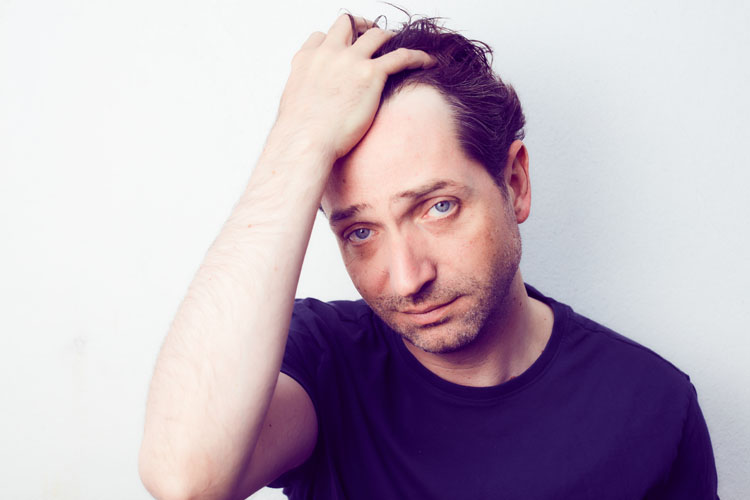
Der Schauspieler Marc Limpach ist seit der ZDF/arte-Erfolgsserie „Bad Banks““ in ganz Europa bekannt. In der Serie spielt er den luxemburgischen Banker Luc Jacoby. Ursprünglich stammt Limpach, der auch Jurist ist, aus der Welt des Theaters. Seit 2007 gestaltet er als Dramaturg den Spielplan des renommierten Kasemattentheaters in Luxemburg.
Weshalb sind Sie Schauspieler geworden?
Ich weiß nicht wirklich „was“ ich im Endeffekt geworden bin, aber ich weiß, dass ich es liebe zu spielen, mich in Figuren zu versetzen, Texte und Situationen zu erkunden und mit anderen Kollegen kreativ zu sein. Ich glaube, dass Theater und Kino die Möglichkeit geben, Empathie für Figuren in besonderen Situationen zu entwickeln, verschiedene Perspektiven zu erdenken und darzustellen und gesellschaftliche Konflikte auf der Bühne zu verhandeln. Theater kann die Welt wohl nicht verändern.
Trotzdem geht es darum, wenigstens den Blick des Menschen auf diese Welt zu verändern, Möglichkeiten menschlichen Handelns zu erforschen und besser zu verstehen. Kunst soll somit allgemein auch den Zuschauer zum Nachdenken anregen und Perspektiven oder Blickwinkel verschieben. Zur Realität gehört oft die Unübersichtlichkeit, das Ungeordnete, die Überstürzung.
Theater und Kino sind heute bestenfalls eine kritisch-ästhetische Reflexion über die größer werdende Unübersichtlichkeit der Welt. Theater soll unterhalten, darf aber kein marktkonformes Entertainment sein. Theater und Kino müssen vor allem Geschichten erzählen und dadurch Fragen stellen. Die Frage nach dem Nötigen und dem Überflüssigen in unserer Gesellschaft. Man kann über Dinge sprechen, über die unsere Gesellschaft am liebsten nicht spricht.
Im Theater lernt man zumindest, dass die „Wahrheit“ sich ständig mit der Perspektive ändern kann. Doch auch die empfundene Wahrheit ist immer auch Resultat von Kämpfen um Grundwerte, die gefochten werden müssen. Konflikte als dramatische und dramaturgische Grundstruktur. Theater und Kino als Konflikt- und Diskursfeld.
Spielen Sie lieber auf der Bühne oder vor der Kamera?
Ich mag beides. Gerade bei der Arbeit als Schauspieler ist es in jedem Falle wichtig, dass die Regie auch kreative Freiräume lässt in denen der Schauspieler sich einbringen kann.
Sind Funkmikrofone für Ihre Arbeit oder die Arbeit Ihrer Kolleg/innen wichtig?
Theater und Kino sind beide, in allen Aufgabenbereichen, sowohl handwerkliche als auch teamorientierte Aktivitäten. Jeder hat seine Aufgabe. Und die jeweiligen Aufgaben der einzelnen Gewerke um die Bühne oder am Set sind alle wichtig und greifen ineinander – wenn es denn funktionieren soll. Auch wenn ich selbst sehr selten mit Funkmikrofonen gearbeitet habe, so muss der Ton seine technischen Mittel frei wählen können und es muss grundsätzlich gewährleistet sein, dass diese Mittel dann auch einwandfrei funktionieren, damit der Zuschauer/hörer auch wirklich erreicht werden kann.
Was wünschen Sie sich von der Politik für die Theater in Europa?
Theater als Ausdrucksform begleitet unsere Kultur nun schon so lange und wird auch überleben. Aber natürlich ist der Gang ins Theater und ins Kino ein „acquired taste“. Man muss es besonders den jungen Menschen ermöglichen, Theater und Kino erfahrbar und erlebbar zu machen, damit der Gang der erwachsenen Bürger dorthin eine Selbstverständlichkeit und ein denk- und dankbarer Genuss werden kann.
Das Interview wurde am 8. März 2020 von der Initiative „SOS – Save Our Spectrum“, Jochen Zenthöfer, geführt.
Foto: Jens Koch

